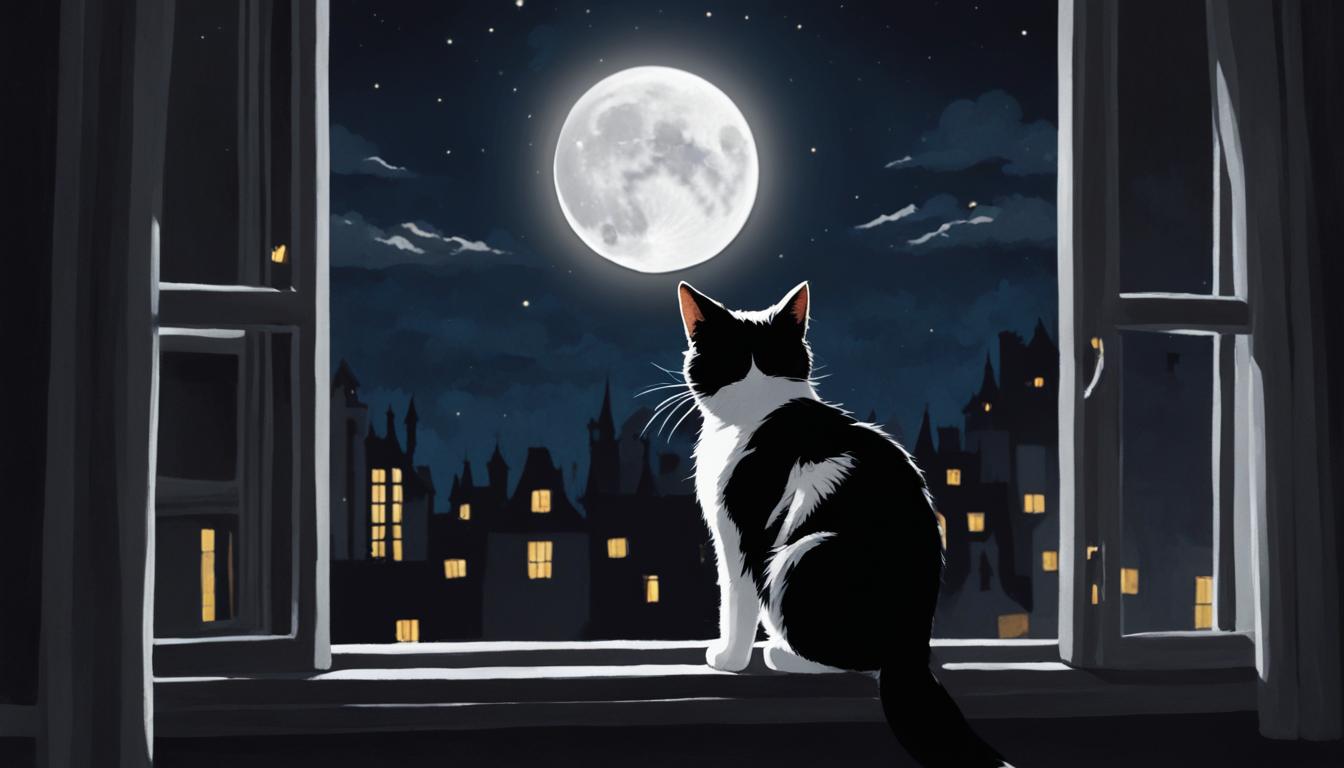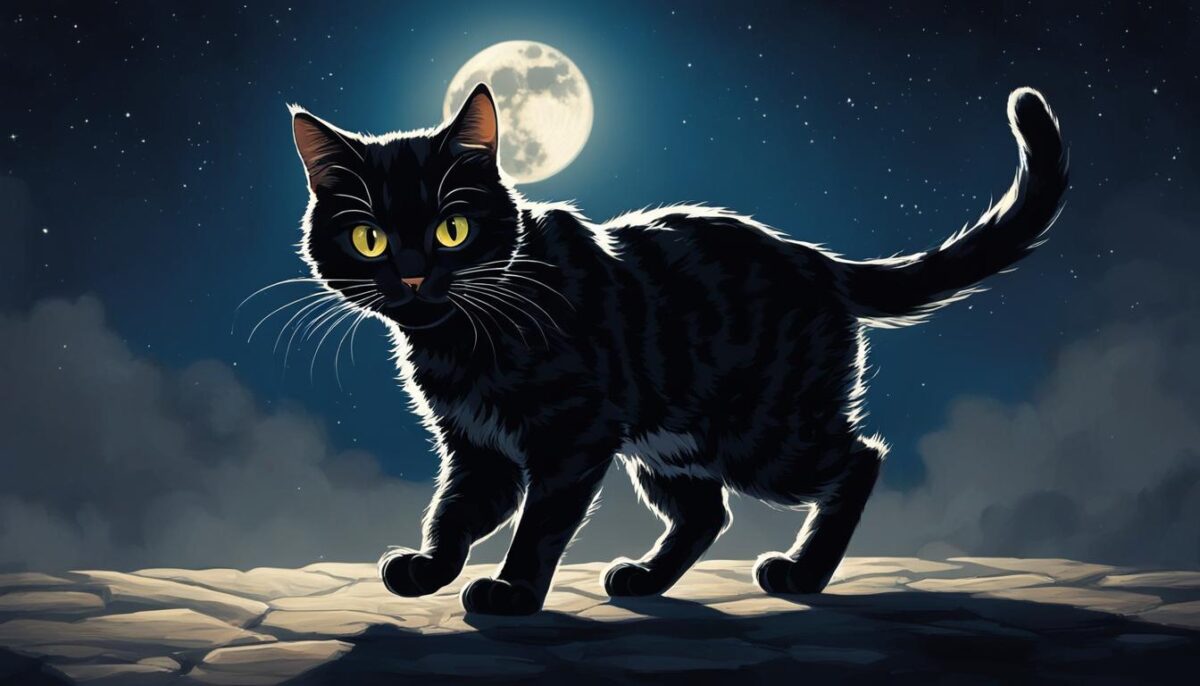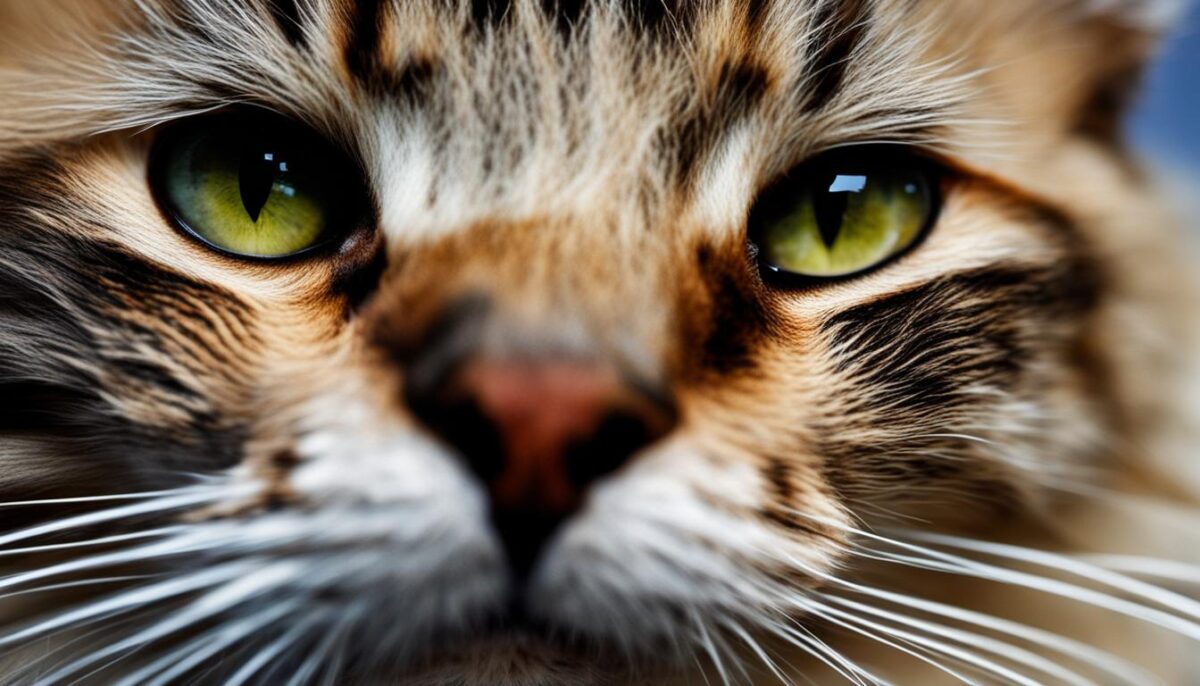Have you ever wondered why your fluffy friend starts meowing when it’s time for you to go to bed? If your cat is meowing at night, there could be a simple reason. Cats talk for many things. They might feel bored, or maybe they are getting older. Sometimes, they could be sick. It is good to listen to these night-time meows. Your cat is trying to tell you something!
If you think something is not right, it is a good idea to take your cat to the vet. If your cat feels fine, there are ways to help them be quiet at night. You can play with them before bed, make sure they have food and water, clean their toilet box, or cuddle with them before you sleep.
Key Takeaways
- Cats meow to talk to you.
- If your cat meows at night, it could mean they need something.
- Going to the vet is important if you think your cat is not okay.
- Playing with your cat before bed might make them meow less at night.
- A clean litter box and fresh food can help, too.
- Cuddles can make your cat feel loved and quiet down.
Understanding Your Cat’s Nocturnal Communications
When the sun goes down, and you’re ready for sleep, your furry friend might just be starting their day. Have you ever wondered why your cat seems to become more talkative at night? The mysterious sounds your cat makes can be their way of telling you all sorts of things!
Normal Patterns of Cat Sounds and What They Mean
Kittens meow a lot to talk to their moms, but grown-up cats use these cat sounds for talking to us, their human friends. They might be saying “hello,” asking for their dinner, or letting you know they’re not feeling their best. Pay attention to the different sounds your cat makes – each one has its own special meaning.
Most of the time, your cat’s meowing is just them being chatty, but sometimes it can mean they need your help. If they’re making noise while it’s dark outside, they might be feeling excited because that’s when they would be out hunting if they lived in the wild.
How Meowing Differs From Other Cat Noises
Cats have a whole bunch of different sounds they make, not just meowing. They might purr when they’re happy, hiss if they’re upset, or chirp when they see a bird outside the window. But when your cat meows, most of the time, it’s their special way of talking to you.
While you’re sleeping, your cat might meow to tell you about their nocturnal activities. They’re not trying to wake you up on purpose. They’re just being themselves, doing their cat things in the night when they’re most awake and full of energy!
Remember, if your cat is talking to you more at night, they’re not being naughty. They’re just following their natural, nocturnal habit of being active when it’s dark. So, give them a little attention or a playful toy to keep them busy, and you might just get that quiet night’s sleep.
Common Causes for Nighttime Meowing in Cats
When it’s dark outside and you’re trying to sleep, your cat might start talking a lot! Have you ever wondered what they are trying to say? Cats might be asking for food, wanting some water, looking to play, or telling you they are not feeling good. Let’s figure out why your furry friend is making those nighttime tunes.
Identifying Signs of Hunger or Thirst
Cats make hunger meows because they like to snack all through the day and night. If you hear this kind of meow, your cat is probably asking for a bite to eat. Cats also give thirst cues when they need water. These meows sound more like a plead or a nag. You should make sure their food bowl is filled before bedtime and that they have fresh water to sip on.
Distinguishing Playful Meows From Distress Calls
If your cat makes a chirp or a chatty meow, they might just want to have some playful behavior. Cats love to hunt at dawn, so they might pretend you’re their prey! But when cats make loud, long meows, it could be distress signals. They might not feel well, or they could be scared. It’s really important to learn what your cat’s meows mean, so you can help them feel better.
Here’s a list to help you tell what your cat needs when they meow at night:
- Hunger meows – a simple, sometimes urgent sounding “meow” for food.
- Thirst cues – similar to hunger meows, but your cat might lead you to their water bowl.
- Playful meows – soft chatter or a gentle ‘brrrp’ when your cat is in a lively mood.
- Distress calls – loud and long cries mean your cat might not be feeling good.
Remember to keep your cat’s litter box clean. If it’s not, they may let you know by meowing. Some cats meow for love, or because they’re looking for a friend, especially if they’re not spayed or neutered. Now you know some reasons why cats meow at night and how you can help them be quieter!
| Type of Meow | Possible Reasons | What You Can Do |
|---|---|---|
| Hunger or Thirst Meows | Empty food bowl or water dish | Check and refill food and water before bed |
| Playful Meows | Wants to play or is feeling frisky | Play with your cat more during the day |
| Distress Meows | Not feeling well or needs comfort | Give them love and check with a vet if it continues |
| Litter Box Meows | Dirty litter box | Keep the litter box clean and tidy |
Behavioral Reasons Behind Your Cat’s Nightly Vocalizations
When the house gets quiet at night, you might hear your cat making noise. This might happen because your cat is nocturnal. This means they feel awake when it gets dark. They feel like playing or looking for food. This is their normal cat’s nocturnal behavior.
Cats are used to waking up when the sun comes up and goes down. In nature, this is a great time for them to hunt for food. But in your home, they do not need to hunt. So instead, they might wake you up with night vocalization.
If your cat did not play a lot during the day, they might feel bored. When they feel bored, they might meow or make noise at night. This is part of feline nocturnal habits. Let’s learn how to make your cat busy and happy during the day, so they can sleep better at night.
- Play with your cat when you are home. Toss a ball or use a toy mouse on a string.
- Give your cat things to do when they are alone. There are toys that your cat can play with by themselves.
- Make sure there is a comfy place for your cat to sleep when they need a nap.
Understanding cat psychology can help you know why your cat does things like meowing at night. Remember, your furry friend loves you and just needs help to have quiet nights.
Medical Concerns That Can Lead to Increased Meowing
If your furry friend is meowing more than usual at night, it’s possible they are not just talking to you. They might be feeling sick. Cats can’t say it in words, so they meow to let us know something might be wrong with their health.
How Thyroid and Kidney Issues May Affect Meowing
Have you noticed your cat getting skinnier or eating a lot more? These could be signs of hyperthyroidism in cats. It’s a big word, but it basically means their thyroid gland is working too much. It can make their heart work too hard and cause other problems. This could make them talk more, especially at night.
Kidney disease is another health issue that might make your cat meow. Their kidneys help clean their blood and get rid of waste, so if they’re not working right, your cat might feel pretty bad. They could drink more water and go to the bathroom a lot, or they could just feel icky and want to tell you about it.
Understanding the Implications of High Blood Pressure in Cats
Cats can get high blood pressure, just like people do. If a cat has high blood pressure, it might cause headaches or trouble with their eyes, and it could even hurt their kidneys. Imagine how you’d feel with a never-ending headache. You’d probably speak up too, and that’s what cats do by meowing. All these health things can make your cat feel unwell and talk more at night.
If your cat’s meowing is keeping you up and you think they might be sick, take them to the vet. It’s super important to check up on your cat’s feline health so that they can feel better and both of you can have peaceful nights again.
Why Is My Cat Meowing at Night and How Can I Help?
When your cat meows at night, you might wonder why. Especially if your cat is getting older, you might hear them talking more. Older cats, or senior cats, can have trouble seeing or hearing. They might not feel safe like they used to. But you can help them feel better.
Age-Related Factors in Nighttime Meowing
Like people, cats change as they get older. Your furry friend might not sleep as much and might start age-related meowing. Sometimes, cats meow because they do not feel well or they are confused. Imagine being in the dark and not seeing everything. Scary, right? Giving your cat a night light can help them see and feel safer.
Environmental Changes and Cat Comfort at Night
Environmental stressors, or changes around your home, can upset your cat. If you move the furniture or bring home new things that make noise, your cat might not like it. To make sure your cat feels okay at night, try to keep things calm and quiet. A cozy bed and a favorite toy can make a big difference to your cat’s comfort.
Remember, playing with your cat before bedtime can make them tired and more ready to sleep. And if you give them a goodnight cuddle, they might just curl up and dream sweet dreams instead of meowing. It’s all about making sure they’re happy before you both go to sleep.
Practical Tips to Reduce Your Cat’s Nocturnal Chatter
If your furry friend is keeping you awake with their nighttime conversations, here are some easy steps to encourage quiet nights and peaceful sleep. First, you’ll want to make sure that they’re not trying to tell you they’re sick or unhappy. After that, let’s try a few things to help with reducing meowing and ensuring everyone’s rest.
- During the day, play more with your cat. Toss a ball or dangle a feather toy to tire them out.
- Keep the litter box super clean. Cats like a tidy place to do their business.
- Consider buying a feeder that drops snacks for your cat at night. This can stop them from waking you for food.
If your cat still meows a lot at night after trying these tips, it could be a good idea to talk with your vet or someone who knows a lot about cat behavior management.
Conclusion
When your kitty talks to you at night with their meows, they are pretty smart. They figured out that meowing is a good way to get your attention. But when you’re trying to sleep, and they’re wide awake and chatty, it can be tough. They might be meowing for many reasons like saying “Hello,” telling you they’re hungry, or maybe they just want to play.
To make sure both you and your cat have a peaceful night, check that they’re feeling fine and have everything they need like food, water, and a clean place to go to the bathroom. If they keep meowing a lot at night and you don’t know why, it’s a good plan to visit the vet. They know lots about feline nocturnal communication and how to keep your cat happy and healthy. The vet might even suggest seeing someone who knows lots about cat behavior to help you out.
Remember, your furry friend doesn’t want to keep you awake on purpose. They trust you and use their meows to talk to you. By responding to cat meowing with kind care, you can help them and make sure everyone in your home gets the rest they need. By learning more about your cat, like why they meow at night, you can both look forward to ensuring peaceful sleep.
FAQ
Why does my cat meow more at night?
Your cat may be meowing more at night due to various reasons such as boredom, active nocturnal behavior, or feeling hungry or thirsty. In some cases, it might be a sign of a medical issue such as hyperthyroidism or high blood pressure, especially if accompanied by other symptoms.
Is it normal for cats to be more vocal at night?
Yes, cats are naturally more active during dusk and dawn, which can lead to increased vocalization during those hours. This is a part of their instinctual nocturnal behavior, correlated with their hunting patterns.
What do different cat meows mean?
Cat meows can vary in meaning based on the context. A short meow might be a simple greeting, while a drawn-out meaow could signal more pressing needs like hunger or a desire for attention. A high-pitched meow might indicate distress or discomfort.
How can I tell if my cat’s meowing is due to hunger or something else?
Hunger meows are typically persistent and may occur around usual feeding times. To discern hunger from other causes, consider your cat’s feeding schedule, body language, and the presence of other signs such as following you to the kitchen or gazing at the food container.
Can my cat’s litter box habits cause nighttime meowing?
Yes, a dirty litter box may lead to meowing if your cat is reluctant to use it. Ensure the litter box is clean to discourage this behavior and reduce nighttime vocalizations.
Should I be worried if my older cat has started meowing more at night?
Increased meowing in older cats could be a sign of disorientation, anxiety, or medical issues like hyperthyroidism or high blood pressure. It’s important to monitor their behavior and visit the vet if you notice any concerning changes.
What can I do to calm my cat at night and reduce meowing?
To help keep your cat calm and quiet at night, establish a routine that involves playtime and feeding before bed. Ensure their environment is comfortable, and they have a clean litter box. If meowing persists despite these efforts, consult your vet.
Is it okay to ignore my cat’s nighttime meows?
While sometimes ignoring the meowing can discourage attention-seeking behavior, it’s crucial first to rule out any underlying issues such as hunger, thirst, or medical problems that could be causing distress.
How do medical conditions affect my cat’s meowing at night?
Conditions like hyperthyroidism, kidney disease, or high blood pressure can increase your cat’s discomfort and lead to more vocalization. Pay attention to other symptoms and have your vet check your cat if you suspect health issues.
Are there behavioral techniques to reduce nocturnal meowing?
Yes, behavioral techniques such as providing enough daytime stimulation, creating a cozy sleep environment, and responding appropriately to meows can help reduce nighttime vocalizations.


